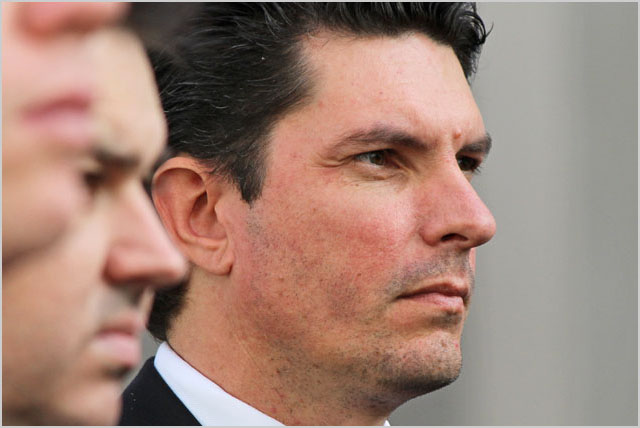
news The electoral fate of Greens Senator and Communications Spokesperson Scott Ludlam is likely to hang in the balance for some time yet, following confirmation yesterday by the Australian Electoral Commission that it would conduct a partial recount of the Western Australian Senate vote in the Federal Election.
Last week, the AEC announced that Ludlam had lost his seat, with candidates from the Liberal, Labor and Palmer United parties elected to the Senate from Western Australia in September’s Federal Election. However, the Greens and the Australian Sports Party appealed for a recount of the vote, given the very small margin in some parts of the counting and the reported existence of anomalies in the count.
In a statement issued yesterday, Electoral Commissioner Ed Killesteyn said he had consider the appeals — made following an earlier decision by the Australian Electoral Officer for Western Australia, Peter Kramer, to refuse applications for recounts of Senate votes.
Killesteyn said that after due consideration of the appeals he had decided to direct a recount of Western Australian Senate ballot papers where electors had marked their ballot above-the-line. This will involve over 96% of votes, or approximately 1.25 million of the 1.3 million formal votes. The recount will additionally re-examine informal votes.
“In making my decision I sought an explanation of the various matters raised in the appeals from Senator Ludlam and Mr Dropulich. I also provided an opportunity for written correspondence from the other key affected parties in the Senate election, namely candidates Senator Louise Pratt (Australian Labor Party) and Mr Zhenya Wang (Palmer United Party),” Killesteyn said.
“While closeness of a particular count in the process of distributing Senate preferences is not in itself a basis for a recount under the Commonwealth Electoral Act 1918 (Electoral Act), it does allow the Electoral Commissioner to direct a recount should there be appropriate grounds on appeal.”
“Having considered candidates’ submissions and having further regard to the criticality of particular Senate candidate exclusion counts and the small margins involved in determining Senators’ elect, I have decided that there should be a recount of all formal Western Australian above-the-line ballots and informal ballots – as determined by Divisional Returning Officers for the fifteen WA electoral divisions in accordance with section 273A of the Electoral Act.”
“I will therefore direct the Australian Electoral Officer for Western Australia to conduct a full recount of all above-the-line Senate ballot papers and informal ballots originally counted in the fifteen electoral divisions in accordance with section 278 of the Electoral Act as soon as possible. I have concluded that the recount will be in the best interest of all candidates who contested the 2013 WA Senate election, and in the overall interest of the WA electorate’s confidence in the outcome,” Killesteyn said.
The Greens welcomed the decision. “We congratulate the AEC for doing what people across the Australian political spectrum have called for and consider reasonable,” Ludlam said in a statement. “With such a marginal result, and a number of anomalies in some batches of the vote, this was the only sensible decision. The Australian Greens will get a team of scrutineers together to oversee the re-count and invite other parties to do likewise.”
However, the statement issued by the Greens noted the party was concerned that the Electoral Commission had said it would not re-count below-the-line votes in Western Australia.
The previous final WA Senate vote elected three Liberal Party candidates, two Labor candidates and a candidate from the new Palmer United Party, despite the fact that the Greens took 9.48 percent of the initial vote and the Palmer United Party took 5 percent of the initial vote.
Ludlam told ABC Radio last week that it appeared the Palmer United Party had been elected on roughly half the vote of the Greens, but that was the sort of result Australia’s electoral system threw up occasionally. He added there was an urgent need for electoral reform.
“It is an elegant system being expertly gamed and manipulated,” Ludlam said. “The whole purpose of an electoral system is to accurately as possible reflect the voting will of the Australian people. It has let us down in this instance.”
If Ludlam does finally and formally lose his Senate seat, the news will come as a blow to the Australian digital rights community, due to Ludlam’s role over the past half-decade after he was elected in 2007 increasingly coming to focus on holding powerful government departments and law enforcement bodies, politicians, corporations and other groups to account for increasing privacy rights violations and the encroachment of telecommunications surveillance in the digital age.
Ludlam would particularly be remembered for a series of fraught encounters with bureaucrats from the Attorney-General’s Department over data retention, telecommunications surveillance and Internet censorship issues, as well as his opposition to Labor’s Internet filtering plans and support for Labor’s National Broadband Network project.
However, the politician will be seen on the Canberra stage for some time yet, with his Senate term not expiring until mid-2014.
Image credit: Australian Greens

Hopefully, the AEC got it wrong the first time…
Comments are closed.